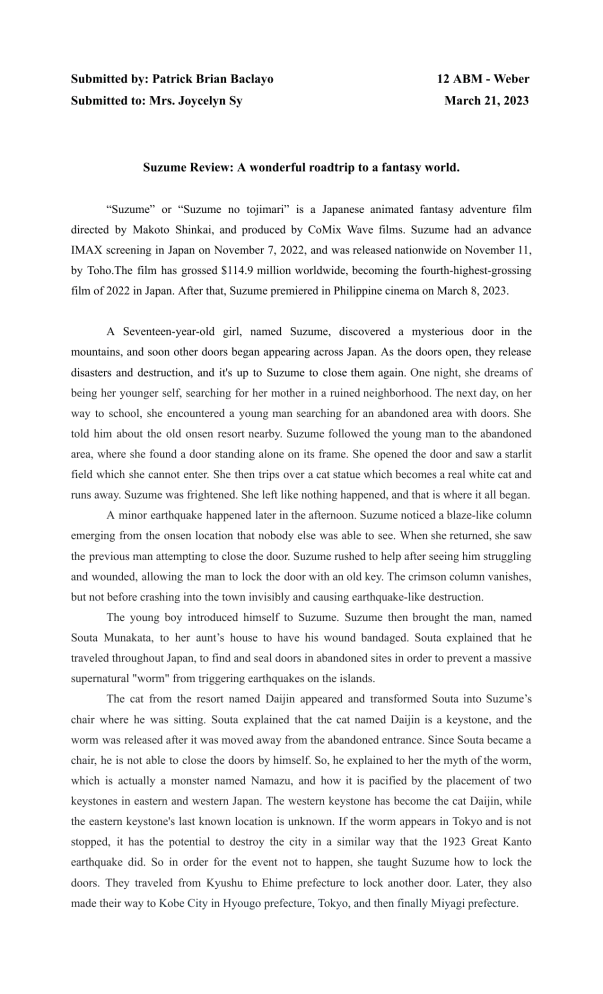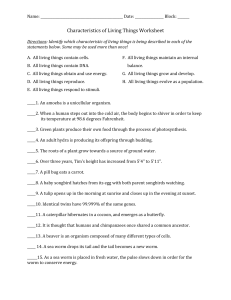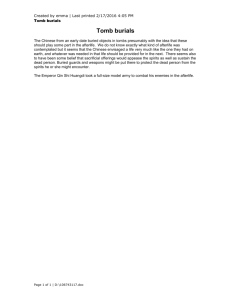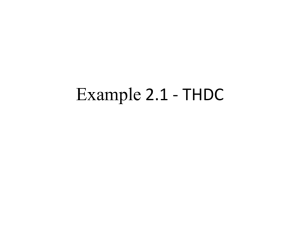Suzume Movie Review: Plot, Themes, and Emotional Impact
advertisement

Submitted by: Patrick Brian Baclayo Submitted to: Mrs. Joycelyn Sy 12 ABM - Weber March 21, 2023 Suzume Review: A wonderful roadtrip to a fantasy world. “Suzume” or “Suzume no tojimari” is a Japanese animated fantasy adventure film directed by Makoto Shinkai, and produced by CoMix Wave films. Suzume had an advance IMAX screening in Japan on November 7, 2022, and was released nationwide on November 11, by Toho.The film has grossed $114.9 million worldwide, becoming the fourth-highest-grossing film of 2022 in Japan. After that, Suzume premiered in Philippine cinema on March 8, 2023. A Seventeen-year-old girl, named Suzume, discovered a mysterious door in the mountains, and soon other doors began appearing across Japan. As the doors open, they release disasters and destruction, and it's up to Suzume to close them again. One night, she dreams of being her younger self, searching for her mother in a ruined neighborhood. The next day, on her way to school, she encountered a young man searching for an abandoned area with doors. She told him about the old onsen resort nearby. Suzume followed the young man to the abandoned area, where she found a door standing alone on its frame. She opened the door and saw a starlit field which she cannot enter. She then trips over a cat statue which becomes a real white cat and runs away. Suzume was frightened. She left like nothing happened, and that is where it all began. A minor earthquake happened later in the afternoon. Suzume noticed a blaze-like column emerging from the onsen location that nobody else was able to see. When she returned, she saw the previous man attempting to close the door. Suzume rushed to help after seeing him struggling and wounded, allowing the man to lock the door with an old key. The crimson column vanishes, but not before crashing into the town invisibly and causing earthquake-like destruction. The young boy introduced himself to Suzume. Suzume then brought the man, named Souta Munakata, to her aunt’s house to have his wound bandaged. Souta explained that he traveled throughout Japan, to find and seal doors in abandoned sites in order to prevent a massive supernatural "worm" from triggering earthquakes on the islands. The cat from the resort named Daijin appeared and transformed Souta into Suzume’s chair where he was sitting. Souta explained that the cat named Daijin is a keystone, and the worm was released after it was moved away from the abandoned entrance. Since Souta became a chair, he is not able to close the doors by himself. So, he explained to her the myth of the worm, which is actually a monster named Namazu, and how it is pacified by the placement of two keystones in eastern and western Japan. The western keystone has become the cat Daijin, while the eastern keystone's last known location is unknown. If the worm appears in Tokyo and is not stopped, it has the potential to destroy the city in a similar way that the 1923 Great Kanto earthquake did. So in order for the event not to happen, she taught Suzume how to lock the doors. They traveled from Kyushu to Ehime prefecture to lock another door. Later, they also made their way to Kobe City in Hyougo prefecture, Tokyo, and then finally Miyagi prefecture. She emerged in the afterlife, which appears to be her town after the earthquake and tsunami, with Souta in stasis from afar. Suzume pulls Souta out of stasis, returning him to human form, while Sadaijin distracts the worm from reentering the living world. After a long chase Daijin accepted defeat and returned to his role as a keystone after playing a long chase. Souta delivered a prayer to keystones to shut the worm once more, bringing back memories of Suzume's hometown. Suzume, holding the Daijin or the western keystone, and Soutta, holding the Sadaijin or eastern keystone, reseal the worm and keep it from departing the afterlife. Sōta then noticed a child in the afterlife: Suzume from 12 years ago. Suzume remembered the first time she entered the afterlife by accident as a child, following the earthquake-tsunami disaster and her mother's death. Young Suzume had mistaken her older self as her mother when she approached. Suzume takes her old chair, built by her mother, from the afterlife version of her ruined home and gives it to her younger self, telling her about her future. Young Suzume exited the afterlife with the chair, leading to her being found by Tamaki 12 years prior. Suzume and Sōta then leave the afterlife themselves, returning to present-day Tōhoku. Sōta returns to Tokyo while Suzume returns to Kyushu, revisiting the friends she made along the way. Later on, Suzume is walking on her way to school in Miyazaki when she runned across Souta again, who is walking up the same road where they first met. This movie is great from the beginning until the end. It has no dry scenes. The storyline is perfectly paced. It brought me different emotions and feelings while watching it. Actually, no words can explain what I really felt while watching the movie. It was all great, including the soundtrack of the movie. It moved me when Suzume said to a younger version of herself the statement “Don’t be afraid of the future, It’s not that scary”. The statement is not that deep, but the meaning behind it gave me realizations. “I want to live. I want to hear your voice. I don’t want to be alone. I fear death!”. This part made me cry knowing that Suzume repeatedly said that she was not afraid of anything, including death. But, when she witnessed Souta’s near death, Suzume admitted for the first time that she, also, was afraid of death. When he heard the true heart of Souta saying that he wanted to live, Suzume also dared to admit it. Suzume feared death, not because she feared pain, but losing Souta, or not hearing his voice again is what Suzume really feared. With amazing messages about the beauty of life and passionate love for life, Suzume is really a great movie that will soothe the hearts and minds of audiences of any age. This movie was successfully made as it caught not just the attention of viewers and audiences but also their feelings and emotions. For documentation purposes only.



